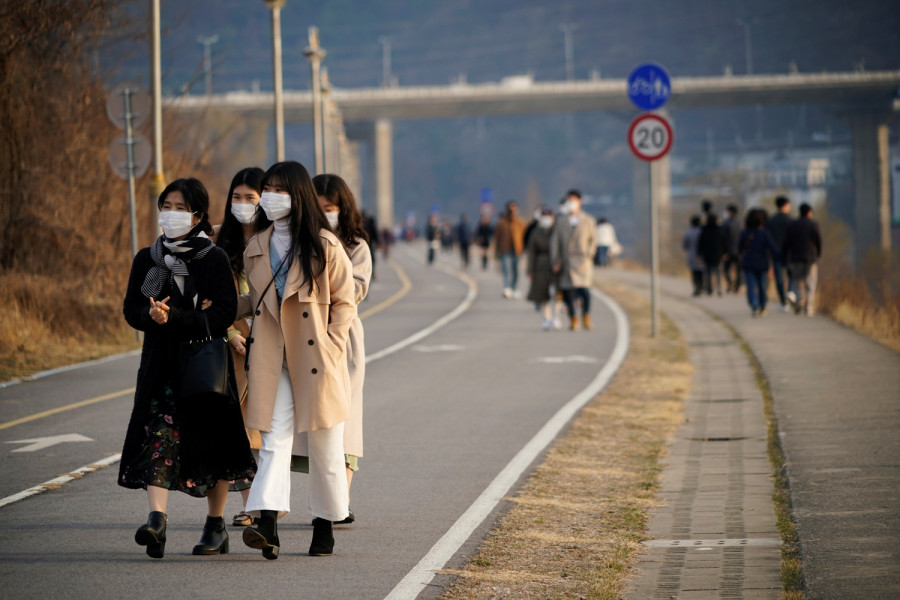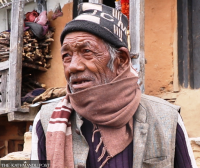National
All empty everywhere: Nepali workers describe life in South Korea under Covid-19
Nepalis are limited to workplaces and their homes, as coronavirus shuts down city after city.
Chandan Kumar Mandal
For the last three years, the South Korean city of Hwaseong has been a second home for Amir Tamang Yonjan. Whenever he gets any free time from work at a chemical factory, Yonjan likes to travel across the city and meet his Nepali friends.
But for the last month or so, Yonjan’s movement has been heavily circumscribed. He leaves his apartment in the morning, goes to work and comes home in the evening. He doesn’t go anywhere else because there’s nowhere for him to go. Like many other cities in South Korea, Hwaseong, a city in the Gyeonggi Province, has turned into a ghost town in the wake of the Covid-19 outbreak.
“Public movement has been heavily affected. You will hardly see anyone on the roads these days,” Yonjan told the Post over the phone from Hwaseong. “I miss that vibrant city life. Public transport used to be crowded. Now, it’s all empty, everywhere.”
South Korea has been most affected, after China, by the Covid-19 outbreak. On Saturday alone, 174 additional coronavirus cases were reported in the country, taking the national tally to 7,313, according to the Korea Centers for Disease Control and Prevention. So far, the death toll has reached 50.
The spread of coronavirus has brought South Korea, the world's 12th-largest economy, to a standstill. Despite the South Korean government enacting stringent prevention, control and testing measures, as many as 60 countries have imposed travel bans or quarantine on arrivals from South Korea.
There are an estimated 60,000 Nepalis in South Korea, with over 3,000 in Hwaseong alone. So far, no Nepali in South Korea has been reported to have been infected with Covid-19 but for a majority of them, life has come to a halt. All Yonjan and his roommate—another Nepali worker—have are the internet and a television in their room as their connection to the outside world. They keep themselves up to date on the situation from the health authorities and follow a fixed timetable to buy groceries, which they make sure last them at least a week.
“We have not met anyone recently. Everyone is inside their home. On weekends, Nepalis generally get together and have fun,” said Yonjan. “No Nepali public events have been organised and even those already scheduled have been postponed. We are keeping in touch only through the internet.”
Nepali workers have been travelling to South Korea for work since 2008 under the Employment Permit System. Considered to have better income opportunities, South Korea is one of the most popular destinations for Nepali migrants, with thousands vying for a place in the country every year.
But the coronavirus outbreak is now impacting their incomes too. Although work has continued at their workplaces for Yonjan and others, their work hours have decreased.
“There is less work in most companies now, although operations have continued,” said Sima Lama, another Nepali who has been working in Hwaseong for over four years now. “There is no overtime and everyone is working their basic hours. This means less income for us.”
The Nepal government, in a travel advisory, has already advised its citizens to refrain from non-essential travel to countries affected by Covid-19, including South Korea, to prevent the spread of the disease to Nepal and among Nepalis.
But not everyone wants to stay in Nepal. While Nepali workers in South Korea are reeling under the terror of Covid-19, there are workers in Nepal who want to travel to South Korea and resume their jobs, fearing the loss of well-paying jobs if they do not report back on time.
One of them is Lil Bahadur Gurung, who returned home to Tanahun in late January for a break. Gurung’s employer has been calling him to resume his work, but he is worried.
“My family is scared. They are hesitant about me leaving,” said Gurung. “But I managed to convince them that nothing will happen to me. If there was any serious problem, why would my employer ask me to come?”
Gurung believes if he remains careful and takes care of personal hygiene, he will not catch the disease. He is all set to leave this Monday to resume his work in Seosan, a city in the South Chungcheong Province.
The Department of Foreign Employment has temporarily stopped labour migration to South Korea in order to protect Nepali workers, but it is allowing those who already have work permits to leave.
In Hwaseong, nearly 300 km far from Daegu—the epicentre of Covid-19 in South Korea, Lama and Yonjan are concerned.
“Our families are worried. If the outbreak becomes as massive as in Wuhan [China], then it will be difficult to repatriate Nepalis as there are thousands of us here,” said Yonjan. “We will only consider returning if the situation worsens.”
Yonjan doesn’t want to return to Nepal; he would rather that Hwaseong returned to its vibrant, lively self.
“There used to be people everywhere,” he said. “Days off meant meeting Nepalis and having fun. The city is silent now.”




 14.12°C Kathmandu
14.12°C Kathmandu













